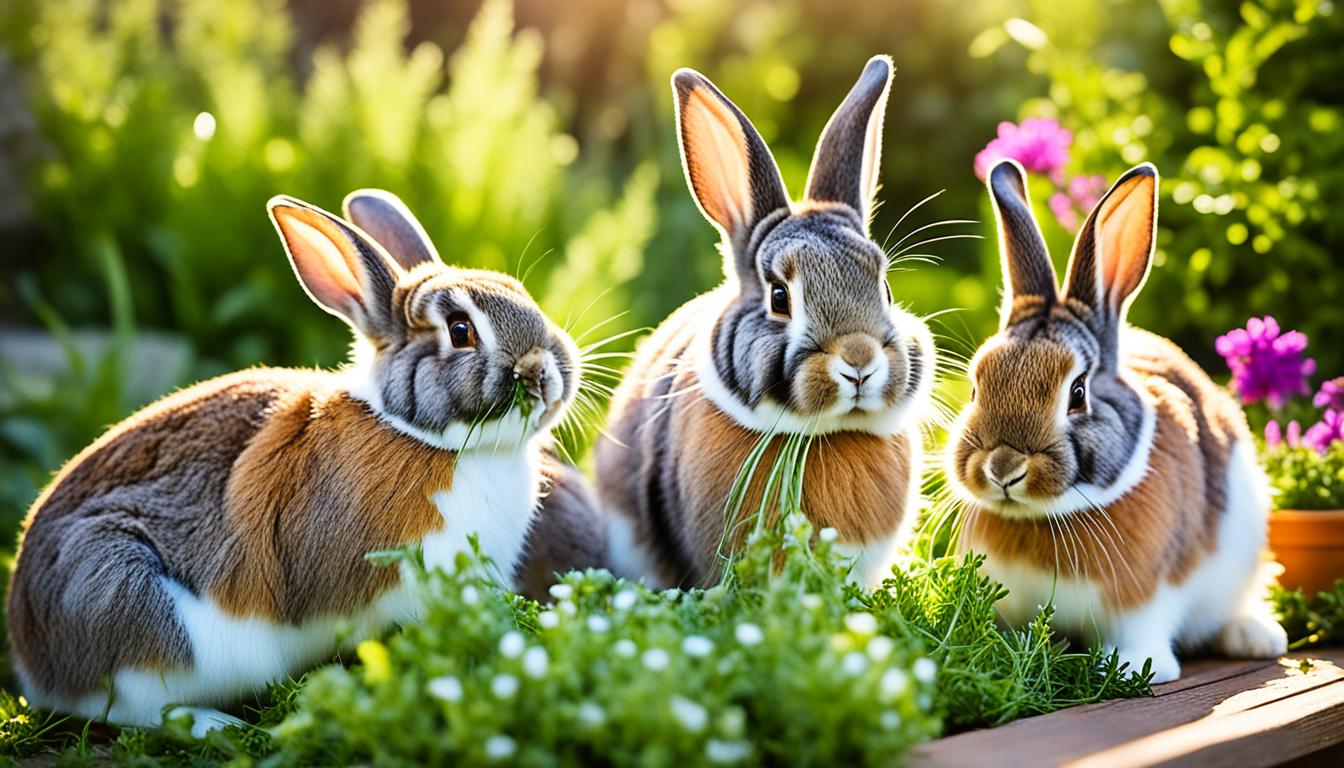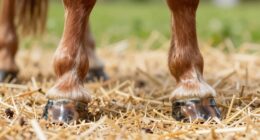Did you know that rabbits can benefit from the medicinal properties of herbs? It’s true! One herb that rabbits can safely enjoy is thyme. Not only do they find it delicious, but it can also help with various digestive issues like diarrhea and expelling worms. In this article, we will explore the benefits of feeding thyme and other herbs to rabbits and provide you with safe herb feeding tips to keep your furry friend happy and healthy.
Key Takeaways:
- Rabbits can safely eat thyme as part of their diet.
- Thyme can help with digestive issues like diarrhea and expelling worms.
- Feeding a variety of fresh herbs is important for a balanced rabbit diet.
- Rabbits have a delicate digestive system and are prone to issues like Gastro-Intestinal Stasis.
- In emergency situations, it is important to seek veterinary help for rabbits with digestive issues.
The Delicate Digestive System of Rabbits
Rabbits have a delicate and unique digestive system. Unlike humans, their digestive tract is unable to handle certain foods and can be sensitive to even small dietary changes. Understanding their delicate digestive system is crucial for maintaining their health and well-being.
“A rabbit’s digestive system is finely tuned, and any imbalance can lead to serious health issues.”
Gastro-Intestinal Stasis is one of the most common problems rabbits face. It occurs when the movement of food through the digestive tract slows down or stops completely. This can be caused by various factors including stress, dehydration, low-fiber diet, and inadequate dental health. When Gastro-Intestinal Stasis occurs, gas can build up in the digestive system, leading to bloating and discomfort.
Gastro-Intestinal Stasis in Rabbits
Rabbits with Gastro-Intestinal Stasis may exhibit symptoms such as loss of appetite, reduced or absent fecal pellets, lethargy, and discomfort. If left untreated, it can result in more serious complications and even death.
Preventing Digestive Issues
One way to prevent digestive issues in rabbits is by providing them with a balanced diet that includes a variety of fresh herbs. Fresh herbs, such as thyme, can help promote digestion and prevent Gastro-Intestinal Stasis. Thyme has natural properties that aid in digestion and can help relieve gas and bloating.
“Including fresh herbs like thyme in a rabbit’s diet can support their delicate digestive system.”
Additionally, long-furred breeds are more susceptible to Gastro-Intestinal Stasis due to the risk of ingesting loose fur during grooming. Regular grooming and hairball prevention measures are essential for these breeds to prevent blockages in the digestive system.
By providing rabbits with a diet consisting mainly of hay, fresh vegetables, and a limited amount of pellets, we can ensure they receive the necessary nutrients while maintaining proper digestive health. It is important to introduce new foods gradually and monitor their response to avoid any adverse reactions.

“A balanced diet combined with regular veterinary check-ups is the key to keeping a rabbit’s delicate digestive system healthy.”
It is crucial to be observant of any changes in a rabbit’s behavior or digestive patterns. Consulting a veterinarian at the first sign of gastrointestinal problems is essential for timely treatment and to prevent further complications.
Common Digestive Issues in Rabbits
| Digestive Issue | Symptoms | Treatment |
|---|---|---|
| Gastro-Intestinal Stasis | Loss of appetite, reduced or absent fecal pellets, lethargy | Veterinary intervention, medication, supportive care |
| Gas and Bloating | Distended abdomen, discomfort, reduced appetite | Dietary adjustments, supportive care, veterinary consultation |
| Dental Problems | Difficulty eating, drooling, weight loss | Dental examination, treatment, appropriate diet |
Proper understanding and care of a rabbit’s delicate digestive system is essential for their overall health and happiness. By providing them with a balanced diet, regular veterinary check-ups, and a stress-free environment, we can ensure that rabbits thrive and enjoy their lives with optimal digestive function.
Benefits of Lemon Balm, Thyme, Parsley, and Chamomile
When it comes to the health and well-being of our rabbits, incorporating a variety of fresh herbs into their diet can provide numerous benefits. Lemon balm, thyme, parsley, and chamomile are four herbs that not only add flavor to their meals but also offer unique advantages for their overall health.
Lemon Balm

Lemon balm is a versatile herb that is known for its calming properties. In rabbits, it serves as a natural muscle relaxant, relieving spasms and aiding in the alleviation of gas and bloating. This fragrant herb can be a soothing addition to their diet and promote gastrointestinal comfort.
Thyme
Thyme is not only a delicious culinary herb but it also offers numerous digestive benefits for rabbits. This herb is effective in treating digestive issues such as diarrhea and can also help expel worms. Adding thyme to their diet can support a healthy digestive system and prevent gastrointestinal discomfort.
Parsley
Parsley is well-known for its versatility in cooking, but it also provides therapeutic benefits for rabbits. This herb is often used to treat constipation, blockages, and kidney issues in rabbits. Its natural diuretic properties can help promote healthy kidney function, while also aiding in digestion.
Chamomile
Chamomile is a gentle and soothing herb that offers both antibacterial and antiseptic properties. In rabbits, chamomile can be used to treat nervousness, anxiety, and stomach issues. It is particularly beneficial for rabbits experiencing digestive discomfort or gastrointestinal upsets.
These herbs can be easily grown in your own garden or purchased fresh from a local market. By incorporating lemon balm, thyme, parsley, and chamomile into your rabbit’s diet, you can provide them with a range of health benefits. Remember to introduce new herbs gradually and monitor your rabbit’s response to ensure their well-being.
Amount of Herbs to Feed Rabbits
When it comes to feeding rabbits fresh herbs, it’s important to get the right balance. Providing a handful of fresh herbs every day is recommended to ensure your rabbits receive the benefits without overdoing it.
Rabbits have a natural instinct to choose the herbs they need at any given time. It’s fascinating to watch them explore their food and select what they feel is right for them. This instinctive behavior helps them maintain a balanced diet and ensures they receive the necessary nutrients.
In addition to fresh herbs, you can also leave some dried chamomile in their feeding area. This allows rabbits to consume it as desired, giving them the freedom to choose when they want to indulge in this herb.
However, it’s important to avoid overfeeding rabbits with herbs. While herbs have numerous benefits, a well-rounded diet for rabbits should include other essential elements like hay and fresh vegetables. Overfeeding herbs can disrupt their balanced diet and lead to nutritional imbalances.
Remember, providing a handful of fresh herbs and allowing rabbits to choose their desired herbs is the key to incorporating them into their diet effectively.
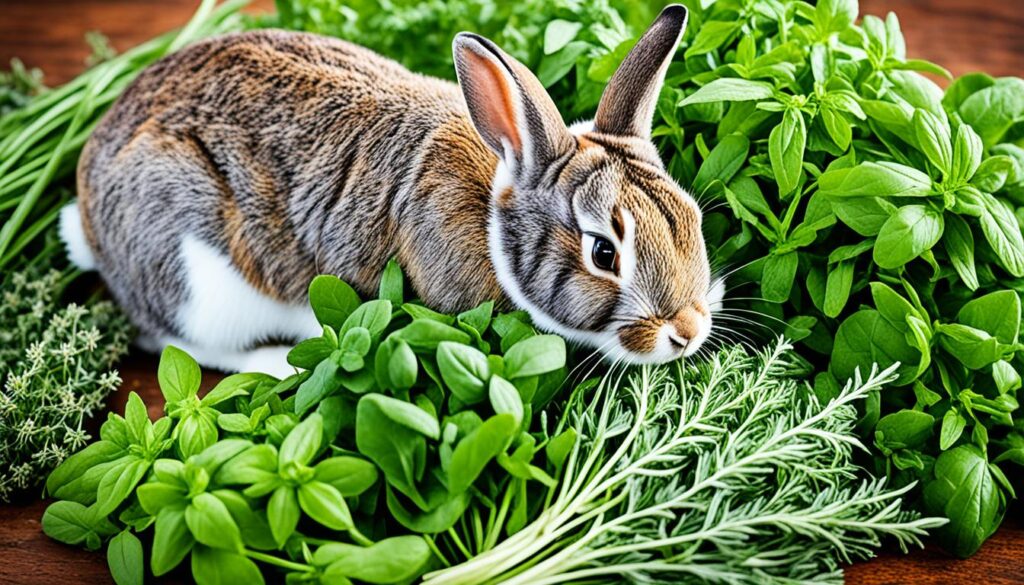
Feeding Fruits to Rabbits
When it comes to feeding fruits to rabbits, it’s important to proceed with caution. While fruits can provide essential vitamins and minerals, they are also high in sugar and should be given in moderation. However, in certain situations, fruits can be beneficial for rabbits’ health and well-being.
When a rabbit is sick and experiencing digestive issues, fruits with high water content can help provide hydration and nutrients. Fruits such as apple, pineapple, and papaya can be given to rabbits to aid in their recovery. Fresh pineapple and pineapple juice, in particular, contain bromelain enzymes that can help break down intestinal blockages and promote better digestion.
Although fruits should not be a staple in a rabbit’s diet, dried fruits like papaya or pineapple can be offered as occasional treats. These treats provide rabbits with a burst of flavor and add variety to their diet, but remember to keep the portions small due to their high sugar content.
Note: It’s always crucial to consult with a veterinarian before introducing any new food to your rabbit’s diet, including fruits. They can provide personalized advice based on your rabbit’s specific health needs and dietary requirements.
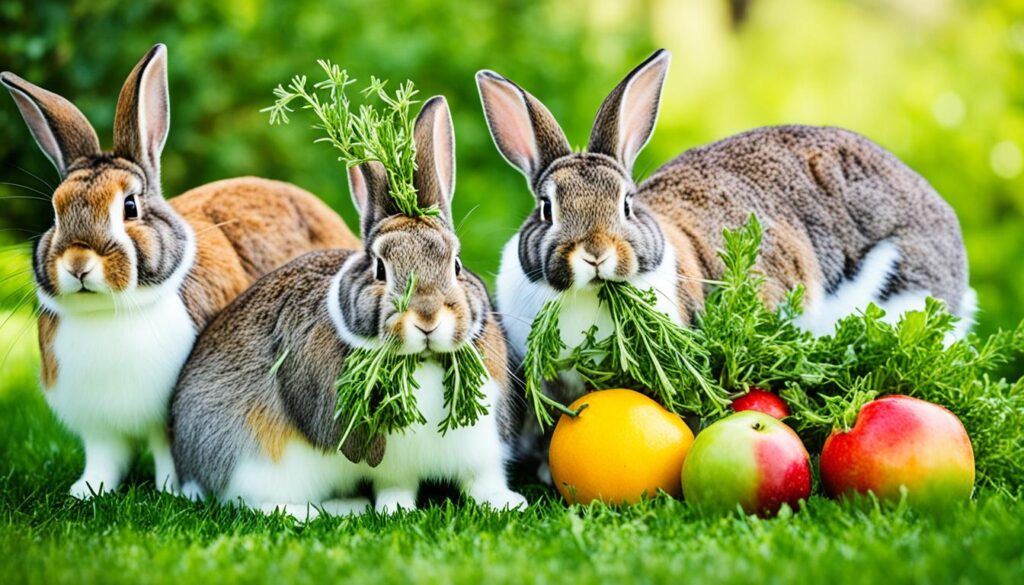
| Fruits | Benefits |
|---|---|
| Apple | Provides hydration and nutrients for sick rabbits. |
| Pineapple | Contains bromelain enzymes to aid digestion and break down blockages. |
| Papaya | Offers occasional treats and adds variety to a rabbit’s diet. |
Remember to introduce fruits gradually to your rabbit’s diet, monitoring their reactions and any potential digestive issues. It’s important to prioritize a balanced diet with a focus on hay, fresh vegetables, and herbs as the main components of a rabbit’s nutrition. By offering fruits in moderation and consulting with a veterinarian, you can ensure your rabbit receives the appropriate diet for optimal health and well-being.
Using Herbs in Emergencies
While a good diet and herbs can help prevent digestive issues in rabbits, in emergency situations, it is important to seek veterinary help. If a rabbit shows signs of pain, lethargy, loss of appetite, or changes in fecal pellets, it is crucial to consult a veterinarian. The vet may prescribe medications to help get the rabbit’s intestines working again. Herbs can complement a rabbit’s diet, but they should not be relied upon solely in emergency situations.

Rabbit-Resistant Herbs for Gardens
When it comes to maintaining a beautiful and thriving garden, rabbits can often pose a challenge. However, there are certain herbs that rabbits tend to dislike, making them a great addition to any garden that wants to deter these furry pests. Here are some of the rabbit-resistant herbs that can help protect your plants:
- Rosemary: This aromatic herb not only adds flavor to your dishes but also repels rabbits with its strong scent. Planting rosemary in your garden can help keep rabbits at bay.
- Lavender: Known for its fragrant flowers, lavender is another herb that rabbits dislike. Consider planting lavender near your garden borders to discourage rabbits from entering.
- Bee Balm: Also known as Monarda, bee balm attracts pollinators like bees and butterflies while repelling rabbits. Its vibrant flowers and aromatic leaves make it a great addition to any garden.
- Mint: While rabbits can be attracted to the sweet scent of mint, planting it strategically can help deter them. Consider growing mint in containers or placing it near your garden perimeter to keep rabbits away from your plants.
Additionally, there are other herbs that rabbits dislike due to their strong scent. Chives, sage, yarrow, and catmint are all examples of herbs that can help protect your garden from rabbit damage. By including these herbs in your garden, you can create a natural barrier that rabbits are less likely to breach.
Remember to consider the specific needs and conditions of your garden when planning the layout. Some herbs may thrive better in certain environments than others, so choose the ones that are best suited to your unique gardening situation.
Enhance your garden’s natural defenses with these rabbit-resistant herbs and enjoy a flourishing garden free from unwelcome nibbling.
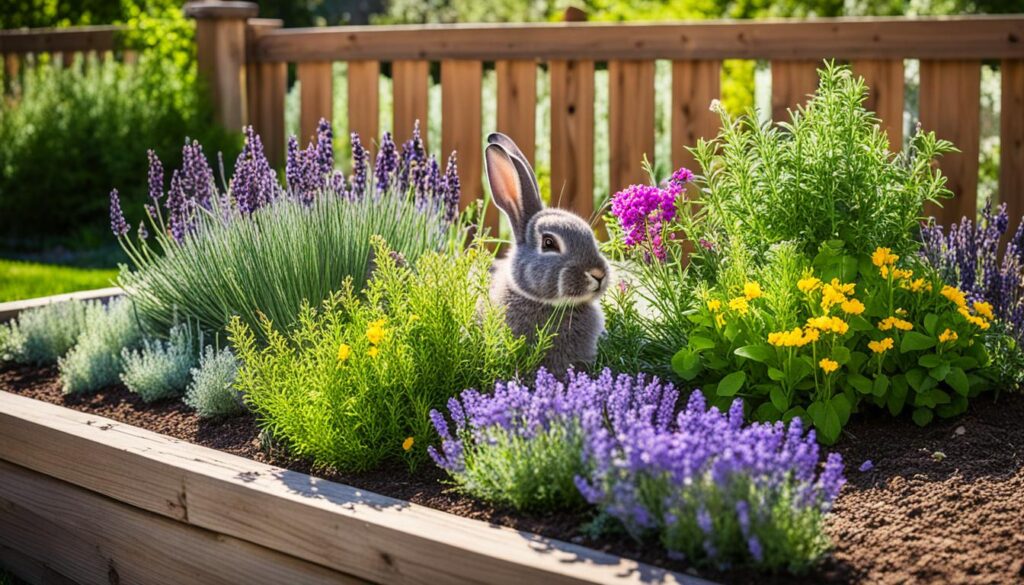
Rosemary, lavender, bee balm, and mint are not only great for deterring rabbits, but they also have various culinary and medicinal uses. So, you can enjoy their beneficial properties while protecting your garden!
A Warning About Aconitum or Monkshood
Rabbits are renowned for their love of nibbling on plants, but it’s essential to be aware of potential dangers lurking in our gardens. One such plant is Aconitum, also known as monkshood or wolfsbane. While it may be touted as rabbit-resistant, this herb is actually highly toxic to rabbits and should be kept far away from them, as well as other pets and children.
Monkshood contains a toxic substance called aconitine that can have severe consequences if ingested by rabbits. Even a small nibble can lead to poisoning, which can manifest as gastrointestinal upset, difficulty breathing, tremors, paralysis, and even cardiac issues in severe cases.
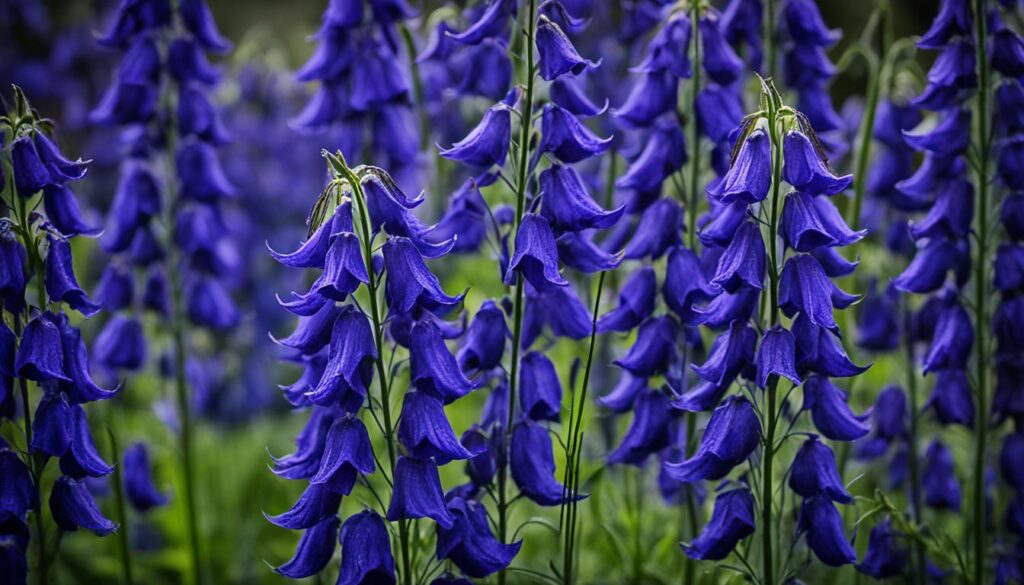
Caution should be exercised when handling aconitum, as contact with the skin can also lead to adverse effects. It’s crucial to wear protective gloves and wash your hands thoroughly after coming into contact with this toxic plant.
It’s worth noting that there are different cultivars of aconitum available, each with its unique flower color, but all possessing the same toxic properties. So, whether it’s the classic blue, purple, yellow, or white variety, they all pose a significant risk to rabbits.
Conclusion
In conclusion, incorporating herbs into a rabbit’s diet can have numerous benefits for their overall well-being. Thyme, in particular, offers digestive advantages such as relieving gas, bloating, and diarrhea in rabbits. However, it’s crucial to remember that a varied selection of fresh herbs is essential for meeting a rabbit’s dietary requirements.
While herbs contribute to a rabbit’s health and happiness, it’s important to have a balanced approach. In emergency situations or when a rabbit displays concerning symptoms like pain, lethargy, or appetite loss, seeking veterinary help is imperative. A veterinarian can provide the necessary guidance and prescribe appropriate medications if needed.
By understanding the benefits of herbs and their role in a rabbit’s diet, we can ensure that our furry companions lead a happy and healthy life. Providing a diverse assortment of herbs and maintaining a well-rounded diet is key to supporting their digestive system and overall wellness.
In conclusion, herbs like thyme can be a valuable addition to a rabbit’s diet, enhancing their vitality and promoting optimal health. However, in any situation that raises concern about a rabbit’s well-being, always consult a veterinarian for expert advice and assistance. The well-being of our beloved rabbits should always be a top priority.
